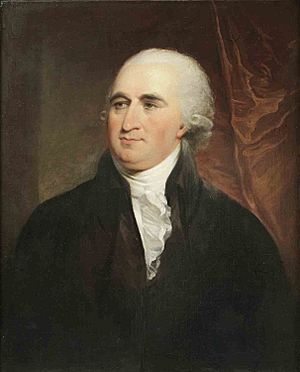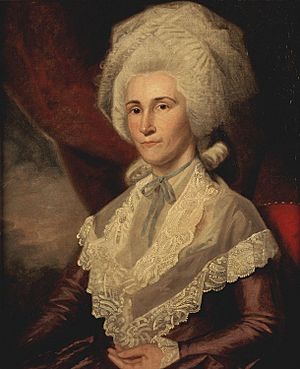James Duane facts for kids
Quick facts for kids
James Duane
|
|
|---|---|

portrait by John Trumbull
|
|
| Judge of the United States District Court for the District of New York | |
| In office September 26, 1789 – March 17, 1794 |
|
| Appointed by | George Washington |
| Preceded by | Seat established by 1 Stat. 73 |
| Succeeded by | John Laurance |
| 44th Mayor of New York City | |
| In office 1784–1789 |
|
| Preceded by | David Mathews |
| Succeeded by | Richard Varick |
| Personal details | |
| Born | February 6, 1733 New York City, Province of New York, British America |
| Died | February 1, 1797 (aged 63) Schenectady, New York |
| Resting place | Christ Episcopal Church Duanesburg, New York 42°46′08″N 74°09′19″W / 42.76896°N 74.15517°W |
| Political party | Federalist |
| Parent |
|
| Relatives | George W. Featherstonhaugh Jr. James Chatham Duane |
| Education | read law |
James Duane (born February 6, 1733 – died February 1, 1797) was an important figure in early American history. He was one of the Founding Fathers, a lawyer, and a leader during the American Revolution from New York. He served in the First Continental Congress and Second Continental Congress. He also helped create the Articles of Confederation. Later, he became the 44th Mayor of New York City and a United States district judge.
Contents
Early Life and Education
James Duane was born in New York City on February 6, 1733. His father, Anthony Duane, was a wealthy Irish immigrant who had been an officer in the British Royal Navy. Anthony later became a successful merchant and landowner. James's mother was Althea Ketaltas, from a rich Dutch family.
Sadly, James's mother died when he was young. His father passed away in 1747. After that, James was cared for by Robert Livingston, a powerful landowner. James finished his early schooling while living with the Livingston family.
In 1754, James Duane finished his law studies with a lawyer named James Alexander. He was very good at understanding legal matters. On August 3, 1754, he officially became a lawyer.
A Busy Career in Law and Politics
James Duane worked as a private lawyer in New York City from 1754 to 1762. After that, he became a clerk for the Chancery Court of New York. This court handled important legal cases.
In 1767, he was the acting attorney general for the Province of New York. This meant he was the chief legal officer. He also helped settle land borders in 1768 and again in 1784. He returned to his private law practice in 1774 and 1775.
Duane was a member of the Federalist Party. This party believed in a strong central government for the new United States. In 1788, he was a delegate to the New York Convention. This meeting voted to approve the United States Constitution.
Law Practice and Land Holdings
James Duane was a very successful lawyer. He represented Trinity Church in a long legal battle. This case was about who rightfully owned a large part of lower Manhattan. The church had received the land from the British king.
By the early 1770s, Duane was earning a lot of money from his law practice. He owned a house in Manhattan and another in the countryside. He also had a huge estate near Schenectady, New York. This estate was about 36,000 acres and had 253 families living on it as tenants.
He was also involved in important organizations. He was a leader at Trinity Church and a trustee for Kings College (which later became Columbia University).
In 1761, Duane bought a farm in New York City called Krom Mesje. He renamed it "Gramercy Seat." This area is now known as Gramercy Park. In 1765, he received a special land grant for an area in Schenectady County. This land became the town of Duanesburg, named after him.
Role in the American Revolution
James Duane was a politically conservative person. This meant he preferred to keep things as they were and avoid big changes. He was against the British government's policies but did not support using violence to protest.
Despite his conservative views, he was chosen to represent New York at the Continental Congress meetings in Philadelphia. These meetings were held to discuss how the American colonies should respond to British actions.
He attended the First Continental Congress in 1774. This meeting happened because the British Navy had blocked Boston Harbor. The British Parliament had also passed harsh laws called the Intolerable Acts after the Boston Tea Party. Duane was one of the delegates who wanted to find a way to make peace with Britain. He supported a plan called the Galloway Plan of Union, but most delegates rejected it.
When he returned to New York, he joined the Committee of Sixty. This committee helped enforce a boycott of British goods. This boycott was agreed upon by the First Continental Congress.
Duane also attended the Provincial Convention in New York City in April 1775. This meeting chose delegates for the Second Continental Congress. Duane served as a delegate from 1775 to 1781. Even though he had some doubts about becoming fully independent from Britain, he eventually supported the Declaration of Independence. He was not in Philadelphia to sign it because he was busy with the Provincial Congress in New York.
When the British army took over New York City in 1776, Duane moved his family to his father-in-law's home for safety. He also helped draft a new constitution for New York State. In July 1778, he signed the Articles of Confederation in Philadelphia. He continued to be an important political leader throughout the war.
After the War
After the war ended in 1783, James Duane returned to his home, Gramercy Seat. He noted that his house looked "as if they had been inhabited by wild beasts" because of the war.
Mayor of New York City
From 1784 to 1789, James Duane served as the Mayor of New York City. He was appointed to this role. As mayor, he immediately showed his generosity. He donated the money usually spent on his inauguration party to help the poor.
During his time as mayor, he worked hard to help New York City recover from the war and the British occupation. He tried to keep the city as the capital of the United States, but this did not happen. He also oversaw a famous court case called Rutgers v. Waddington. His decision in this case did not fully please either side, and he was later questioned by the State Assembly about it.
Other Post-War Roles
Duane was a member of the New York State Senate from 1782 to 1785, and again from 1788 to 1790. In 1785, he was one of 32 important New Yorkers who started the New York Manumission Society. This group worked to end slavery in New York.
Federal Judge
On September 25, 1789, President George Washington nominated James Duane to be a judge. He was to serve on the United States District Court for the District of New York. The United States Senate approved his nomination that same day. He officially became a judge on September 26, 1789. He served until March 17, 1794, when he resigned due to poor health.
Family Life
On October 21, 1759, James Duane married Mary Livingston. She was the oldest daughter of his former guardian, Robert Livingston. They had several children:
- Mary Duane (born 1762), who married General William North.
- Catharine L. Duane.
- Adelia Duane (1765–1860), who married Alfred Sands Pell.
- James Chatham Duane (1769–1842), who married Mary Ann Bowers.
- Cornelius Duane (1774–1781), who died young.
- Sarah Duane (1775–1828), who married George W. Featherstonhaugh.
James Duane also had many grandchildren and great-grandchildren who became notable figures.
Death and Legacy
James Duane passed away on February 1, 1797, in Duanesburg, New York. He was buried under Christ Church in Duanesburg.
Several places and things are named in his honor:
- Duane Street in Manhattan, New York City.
- Duane Park, located at Duane and Hudson streets in Manhattan.
- The Fire Department of New York had a fireboat named James Duane from 1908 to 1959.
- The town of Duanesburg in Schenectady County, New York, is named after him. He owned most of this land originally.
Today, the Northern District of New York Federal Court Bar Association gives out an annual award in his name. The Judge James Duane Award honors lawyers who show excellence, honesty, and dedication to the legal profession.
 | Victor J. Glover |
 | Yvonne Cagle |
 | Jeanette Epps |
 | Bernard A. Harris Jr. |


